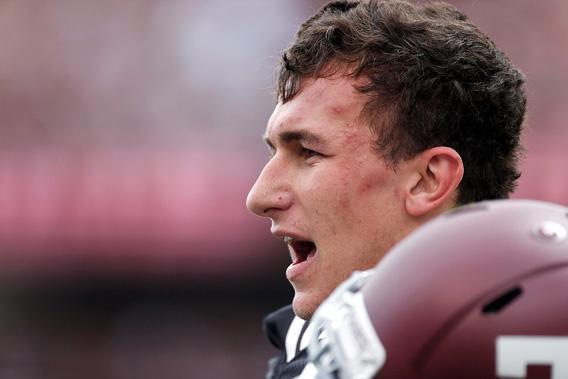College football is a lot like prison. It can be relentlessly violent. You need permission from an authority figure to do anything. Everyone eats together in a cafeteria, wears uniforms, and lifts weights all the time. And since nobody’s got any cash, you need to extract value from whatever you can get your hands on. In prison, the economy used to run on cigarettes; now, inmates trade mackerel and postage stamps. In college sports, an athlete can peddle his jersey, his complimentary game tickets, and—in the case of Texas A&M quarterback Johnny Manziel—allegedly his signature.
I believe college athletes should be paid. A lot of people disagree, arguing that they already do get compensated … in a way. “Student-athletes earn free tuition, which over the course of four years can exceed $200,000,” says Sports Illustrated’s Seth Davis, who gets a nice paycheck to gab about unpaid laborers. “They are also provided with housing, textbooks, food and academic tutoring. When they travel to road games, they are given per diems for meals.”
What Davis and others don’t seem to understand is that money is the only thing that’s money. Google employees get a free shuttle to the office, free food in the cafeteria, a free on-site gym, and free continuing education classes. They also get salaries, because paying people in perks is illegal for every employer except the NCAA.
There’s a long tradition of college athletes, in defiance of NCAA rules, exchanging their work gear and other freebies for the money they’re denied. In 2003, a couple of LSU players were benched for selling their complimentary Sugar Bowl tickets. Three years ago, Georgia star A.J. Green had to sit out four games for selling his Independence Bowl jersey for $1,000. And a slew of guys from Ohio State, including quarterback Terrelle Pryor, were suspended for trading jerseys, championship rings, and other football paraphernalia for tattoos and cash.
So go ahead, pick your metaphor. Playing at a school like Oregon—where every surface in the new football facility is fashioned from some combination of leather, Brazilian hardwood, and flat-screen TVs—is like being incarcerated in the world’s awesomest correctional facility, or it’s like working for an American tech giant while getting compensated like you’re in a Chinese sweatshop. (Although in fairness to the Chinese sweatshops, they do actually pay their employees.) As Bryan Curtis wrote in Grantland last year, college athletic departments don’t give their athletes cash. Instead, they “surround the players with it.”
If most college athletes are surrounded by money, Johnny Manziel is entombed by it. As Patrick Hruby and Jason Cohen have explained, Texas A&M capitalized on Johnny Football’s Heisman Trophy–winning 2012 season to push through a $450 million plan to redevelop the Aggies’ stadium. On a smaller scale, Manziel’s hometown Kerrville (Texas) Daily Times brought in some extra cash with a special “This Is Our Johnny” supplement that included 49 advertisements. And until this week, when, for perhaps the first time ever, the NCAA was shamed by its own hypocrisy, you could search for “Manziel” on the NCAA Shop website and buy your choice of No. 2 Texas A&M jerseys. (The NCAA has temporarily shut down this online store and will relaunch it shortly, presumably as soon as it gets a shipment of “Mohnny Janziel” apparel in stock.)
Everybody’s making money off Johnny Manziel except Johnny Manziel. Unless, that is, the allegations are true and the quarterback was paid by brokers to sign a whole bunch of sports memorabilia. As opposed to, say the Kerrville Daily Times, which cashes in on the local hero in a fairly straightforward fashion, Manziel has been forced—again, allegedly—to make money off his own name in a rather baroque way. The Heisman winner reportedly exchanged a commodity he had in abundance—his signatures—for something he actually wanted: sweet, sweet cash.
Now, Manziel must wait and see if the NCAA casts him out of college football forever for having napalmed his amateur status. The quarterback is now represented by a lawyer who wears a cowboy hat, which leads me to assume he’ll be on the field for the Aggies’ season opener—as far as I know, a lawyer in a cowboy hat has never lost a case. Even so, Manziel wouldn’t have to go through this whole did-he-or-didn’t-he charade if the NFL allowed players to turn pro before they were three years out of high school. And so this Heisman-winning college sophomore is in football purgatory. He’s one of the most talented, most marketable athletes in America, and if he makes any money off of his talent, then he’s going to get benched. That sounds a lot like prison to me.
